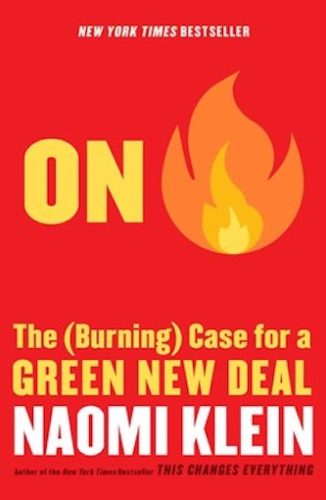Book Review: “On Fire” — An Optimistic Take on Climate Change
By Ed Meek
In this book, Naomi Klein shines a light on the path to a politically and economically just model of sustainability.
On Fire: The (Burning) Case for a Green New Deal by Naomi Klein. Simon & Schuster, 292 pages. $21.99.

Naomi Klein is well known for her book The Shock Doctrine, in which she talks about the way those in power take advantage of a crisis to advance their own agenda. Nineteen Arabs fly planes into the World Trade Center so the Bush administration uses the opportunity to invade Iraq.
Klein has written extensively about climate change and this collection draws from her talks and articles about climate from the last nine years. She sees this crisis as an opportunity for change, but she wants change to come from us — not from our corporate overlords. Because climate change affects so many aspects of our lives, Klein sees this challenge as an opportunity to create a more just and humane world. In order to get there, she argues, we need to embrace The Green New Deal proposed by AOC and the progressive democrats. Her approach: to cite evidence of the terrible changes being wrought by climate change, but to supply optimism by praising The Sunrise Movement, Greta Thunberg, and other signs that people around the globe are waking up to what is happening and finally demanding change.
So, if you want a positive take on the future, Klein is here to give you hope. In addition, partly in response to criticism of her book This Changes Everything, in which Klein argued that climate change presented us with an opportunity to create a more utopian, post-capitalist world, she claims here that she is not against capitalism per se. She is for a regulated capitalism, one that offers a more level playing field in a world that proffers a true democracy.
The Green New Deal brings employment to the discussion of climate. Where, in the past, the criticism of the solutions of environmentalists has been that jobs will be lost, The Green New Deal will create new jobs as we transition from a fossil fuel-based economy to green energy, “a sweeping industrial and infrastructure overhaul” says Klein. “It will be a massive job creator…jobs in wind, solar and energy efficiency.” In other words, the GND will be the infrastructure bill promised by Obama and Trump — but refocused to deal with climate. In addition to government funding, Klein suggests removing government subsidies for fossil fuels and making the oil companies pay for redevelopment. She also wants our military budget cut by 25% to free up funding. Klein insists the GND crosses ideological lines because it will improve life for all of us and bring Americans together.
Klein has not forgotten how we got to this point. In one chapter, she looks back at the BP oil spill in the Gulf and the Exxon Valdez spill in Alaska. Those areas never really recovered from the damage caused. Nonetheless, Sarah Palin chanted “drill baby drill” and Obama continued to permit offshore drilling. BP and Exxon continue to run ads full of smiling workers and claim they are investing in green energy. Klein talks about how the green movement has been derailed over the years by a disinformation campaign coming from right wing politicians financed by big oil. Massachusetts Attorney General Maura Healey is part of a lawsuit that charges Exxon for misleading the public (and their stockholders) regarding the dangers of oil — threats that they knew about, but hid, since the ’70s.
In the chapter “Capitalism vs. the Climate” Klein ventures into the opposition camp at the Heartland Institute’s Conference. There speakers argue environmentalists are trying to take away America’s freedoms and lead us down the path of communism by redistributing the wealth and, according to Marc Morano, editor of ClimateDepot, “sacrificing countless people to appease the gods and change the weather.”

Naomi Klein — if you want a positive take on the future, she is here to give you hope.
Unfortunately for the denialists, their positions are getting harder and harder to defend given what we are currently witnessing: wildfires in the Sonoma Valley, the leveling of Puerto Rico, the year by year increases in temperature, flooding in the mid-west, rising seas and warming ocean temperatures. Slowly, reality is beginning to sink in. Two thirds of Americans now see climate change as “a crisis or a serious problem,” according to The Guardian.
Klein has an interesting take on what role we each have to play when it comes to combating climate change. In a chapter entitled “Stop Trying to Change the World All by Yourself” she points out that — because our culture puts such an emphasis on the importance of the individual — we think we can single-handedly affect climate change by becoming a vegetarian or driving a Prius, or turning down the heat. Klein says individual changes are all good, but real action means joining fellow citizens to protest with groups like The Sunrise Movement, and in electing politicians who will work for us to defund the fossil fuel companies and invest in green energy. A Harvard University Study recently concluded that if you can get 3.5% of the population to protest, results will follow. We’ve seen this recently in Hong Kong and Puerto Rico. That would mean millions of Americans in the streets.
For a sober take on the climate, read Uninhabitable Earth by David Wallace Wells and The Sixth Extinction by Elizabeth Kolbert. For a pragmatic angle, turn to Bill McKibben’s Falter. If you are looking for a more encouraging view of our future, pick up Klein’s new book. She shines a light on a politically and economically just model of sustainability.
Ed Meek is the author of Spy Pond and What We Love. A collection of his short stories, Luck, came out in May. WBUR’s Cognoscenti featured his poems during poetry month this year.

